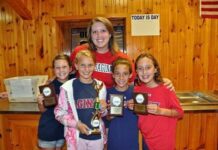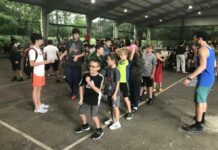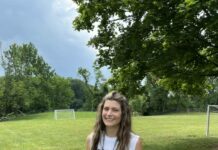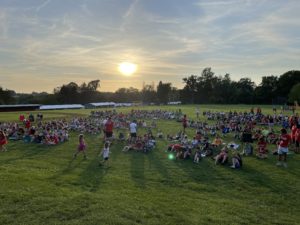
At Jewish summer camps, the motto is often “10 months for two.” Campers wait out the other 10 months of the year for the two magical ones at camp.
In 2021, though, it was “22 months for two,” said Sarah Sideman, director of the JCC Camps of Medford, New Jersey. Kids ended camp in 2019, mostly sat out the canceled pandemic summer of 2020 and finally returned in 2021.
As a result of the extended — and unwelcome — break, Sideman said, “There was a lot of anticipation.”
And the summer seems to have lived up to the hype.
Vaccination rates for staffers and campers 12 and over were above 90% at most camps, and at the start of the summer, COVID cases, hospitalizations and deaths were relatively low across the U.S.
So, camps throughout the Philadelphia region hosted full seasons. Kids smiled, laughed and just hung out. Counselors motivated them to participate in the various activities. Head staffers oversaw the operation.
It was exactly what the kids needed after a summer away and a year of virtual schooling.
“Utopia,” said Rabbi Joel Seltzer, director of Camp Ramah in the Poconos.
Sideman’s JCC Medford team started planning 2021 in March 2020. Most area day and overnight camps began preparing their summer sessions around the same time.
Day camps built plans around checking people for COVID symptoms at the start of each day. That way, if directors spotted even minor signs, they could send kids home to quarantine.
Overnight camps built a “controlled environment,” as they called it. They mandated tests before the summer started, on the first day and within the first week. They eliminated out-of-camp trips from the schedule. They even required counselors to stay in camp on off days.
Southampton Summer Day Camp in Bucks County canceled 2020 after 47 consecutive summers. It reopened this year with only 350 campers, instead of the normal roster of 500. The goal, according to owner Rick Blum, was to keep bus loads small and bunk/activity cohorts at 12-15 kids each.
Southampton parents had to answer a COVID questionnaire, via text, every day at 6 a.m. Then counselors took kids’ temperatures before they allowed them onto buses.
Only one camper got COVID all summer, and it came from his sister’s day care center, not Southampton.
“It was amazing to see all the smiling faces out there,” Blum said of the 2021 season.
Camps Saginaw, Green Lane and Nock-A-Mixon, overnight camps in the suburbs, canceled 2020 because directors didn’t know enough about the virus and wanted to maintain trust with families after almost a century of continuous operations.
In 2021, though, all three camps hosted full loads of between 300 and 500 campers. Once they got through their final testing period early in the summer, directors let everybody take their masks off. Saginaw campers and staff members gathered on the upper field and threw their masks in the air. The owners, Mike and Jessica Petkov, recorded the moment with a drone.
“We’ve made it this far,” Mike Petkov said. “Let’s keep going.”
All three camps finished the summer with no COVID cases.
Gary Glaser, the director of Nock-A-Mixon, said fighting and homesickness were down this summer, and that campers seemed happy just to be out of their houses and together.
But Glaser and the Petkovs called their counselors the heroes of the summer.
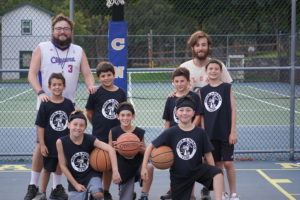
Nock-A-Mixon allowed 12-hour off days, where counselors could only go home, not out and about. They also had to be accessible via FaceTime. Saginaw, like other overnight operations, required counselors to stay in camp on off days.
Counselors knew this situation going into the summer and accepted it.
“They had to make sure the kids were having a good time, and they excelled,” Petkov said.
Some day camps, like Achdus in Northeast Philadelphia and the JCC of Medford, were open in 2020. But Achdus cut its camper quota from about 90 to 60. JCC Medford dropped its total from roughly 1,300 to 200.
This year, both places opened in full and finished their seasons. Achdus staffers just kept their eyes open for symptoms, according to Director Moshe Segelman. JCC counselors kept kids in cohorts and enforced masking when different groups interacted.
“Families were so ready to come back,” Sideman said.
Camps lost money last year, but in 2021, they learned that their families remained loyal.
So going into 2022, they are confident. They aren’t too worried about the new delta variant, either, nor the recent increase in cases and restrictions. Even if the COVID era continues, directors now have systems in place to handle it.
Blum turned Southampton’s approach into a 20-page handbook. The Bucks County Health Department recently asked for it to use as a guidebook for local recreation programs.
“These are things we’re going to continue to do,” Blum said. “I don’t see that we’ll eliminate that until COVID is out of here.”
[email protected]; 215-832-0740



